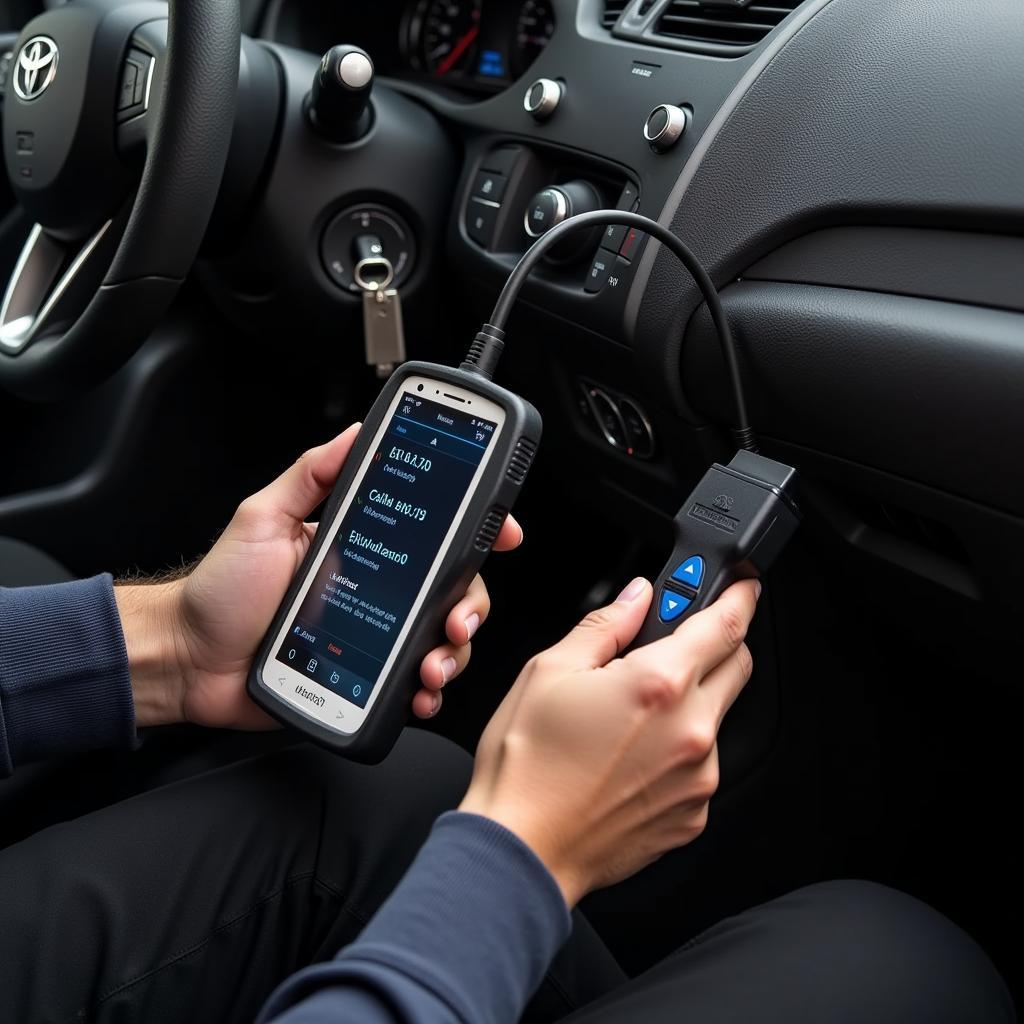A Diagnostic Scan For Car is an essential part of modern vehicle maintenance. It allows mechanics and car owners to delve into the car’s computer system, reading error codes and real-time data to identify and diagnose issues that might be affecting performance. Whether you’re experiencing engine trouble, warning lights on your dashboard, or simply want to stay ahead of potential problems, a car diagnostic scan can provide invaluable insights.
Understanding the Importance of a Diagnostic Scan for Car
Gone are the days when mechanics relied solely on their intuition and experience to identify car problems. Today’s vehicles are complex machines with intricate electronic systems. A diagnostic scan for car acts like a window into these systems, revealing a wealth of information that would otherwise remain hidden.
 Car Diagnostic Scan Engine
Car Diagnostic Scan Engine
Here’s why a diagnostic scan is crucial:
- Accurate Problem Identification: Instead of relying on guesswork, a diagnostic scan pinpoints the source of the issue by reading error codes stored in the car’s computer.
- Early Detection: Often, car problems manifest as minor symptoms or warning lights that might be easily ignored. A diagnostic scan can detect these issues early on, preventing them from escalating into major repairs.
- Cost-Effectiveness: By identifying problems early, a diagnostic scan can save you money on potentially expensive repairs down the line.
- Improved Vehicle Performance: A diagnostic scan can help optimize your car’s performance by ensuring all systems are functioning correctly.
What Does a Diagnostic Scan for Car Tell You?
A car diagnostic scan provides a comprehensive overview of your vehicle’s health by accessing various systems, including:
- Engine and Transmission: It checks for issues related to fuel/air mixture, ignition timing, RPM, transmission shifting, and more.
- Emissions System: It analyzes the performance of the catalytic converter, oxygen sensors, and other components related to emissions control.
- Brakes: It monitors the Anti-lock Braking System (ABS), traction control, and other safety systems related to braking.
- Airbags: It ensures the airbag system is functioning correctly and identifies any faults.
- Other Systems: Depending on the scanner and the car model, a diagnostic scan can also provide insights into the air conditioning, power steering, and other electronic systems.
Types of Diagnostic Scans
There are different types of car diagnostic scans available, each offering varying levels of detail and functionality:
- OBD-II Scanners: These are the most common type, designed to read the standardized On-Board Diagnostics (OBD-II) codes found in most cars manufactured after 1996.
- Professional-Grade Scanners: Used by mechanics and dealerships, these advanced scanners offer more in-depth analysis, including live data streaming, bi-directional control, and access to manufacturer-specific codes.
Choosing the Right Diagnostic Scanner
With a wide array of diagnostic scanners available, selecting the right one depends on your needs and expertise:
- DIY Car Owners: For basic code reading and resetting, an affordable OBD-II scanner, like the Topdon ArtiLink200 OBD2 Scanner OBD-II Car Diagnostic Tool, is a good starting point.
- Tech-Savvy Enthusiasts: Enthusiasts who enjoy tinkering with their cars might prefer a car diagnostic scanner laptop for its advanced features and software capabilities.
- Professional Mechanics: Professional-grade scanners with comprehensive functionalities are essential for mechanics and workshops.
DIY vs. Professional Diagnostic Scans
While DIY car diagnostic scans can be helpful for basic troubleshooting, there are limitations:
- Limited Information: Basic scanners might not provide access to all systems or manufacturer-specific codes.
- Interpretation of Codes: Understanding and interpreting error codes accurately requires mechanical knowledge.
- Complex Repairs: Addressing complex mechanical or electrical issues often requires professional expertise.
When to Get a Diagnostic Scan
It’s advisable to get a diagnostic scan for your car in the following situations:
- Check Engine Light: This is the most obvious sign that your car’s computer has detected a problem.
- Unusual Noises: Any unusual knocking, grinding, or squealing sounds could indicate an underlying issue.
- Performance Issues: Experiencing reduced fuel efficiency, rough idling, or difficulty starting your car warrants a diagnostic scan.
- Before Buying a Used Car: A pre-purchase inspection that includes a diagnostic scan is crucial when considering a used vehicle.
Conclusion
A diagnostic scan for car has become an indispensable tool in today’s automotive landscape. By offering a glimpse into the intricate workings of your vehicle’s electronic systems, it empowers car owners and mechanics to diagnose issues accurately, prevent costly repairs, and ensure optimal performance. Whether you opt for a DIY scan or seek professional assistance, a car diagnostic scan is a worthwhile investment in the health and longevity of your vehicle.

Leave a Reply